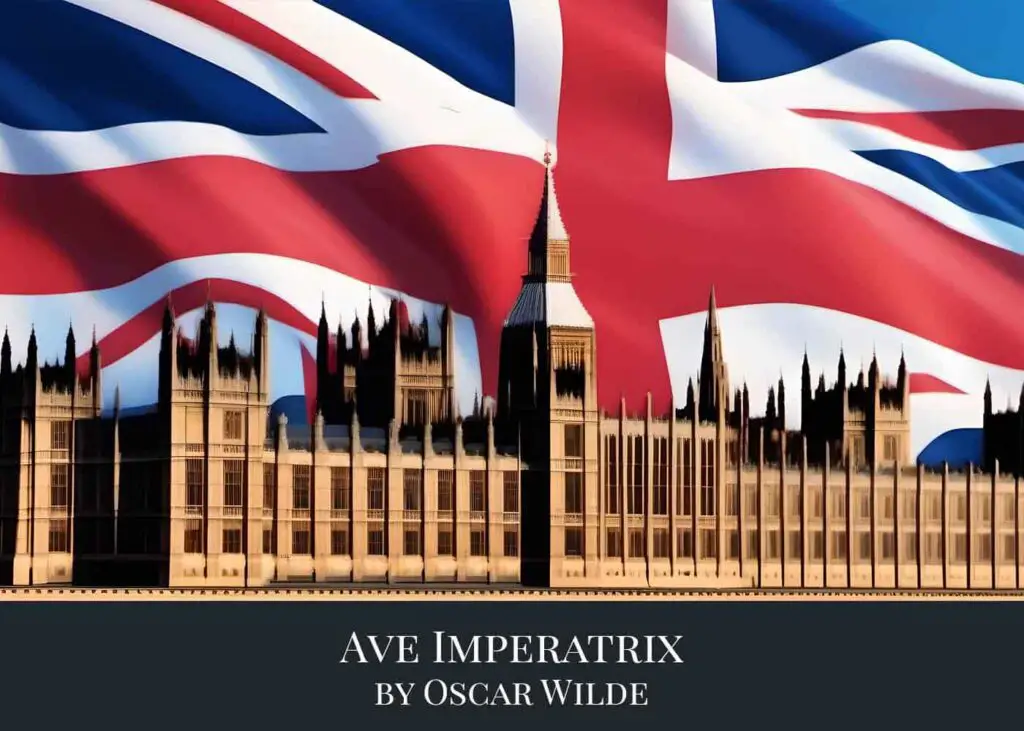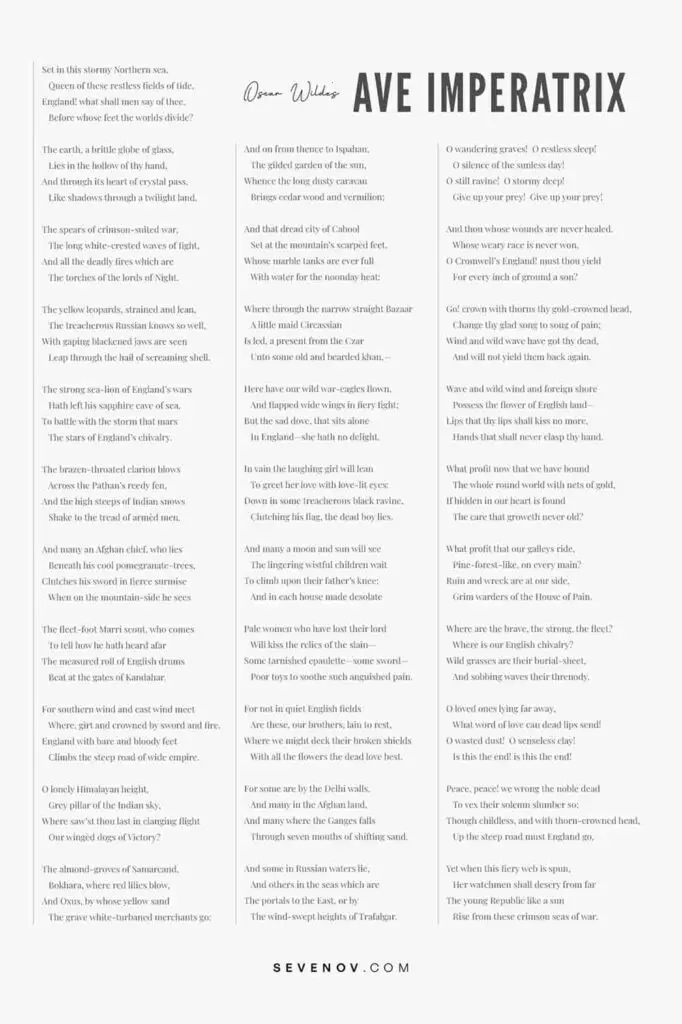
Ave Imperatrix by Oscar Wilde
“Ave Imperatrix” is a poem by Irish playwright and poet Oscar Wilde and it touches upon the complexities of British imperialism, portraying both its grandeur and its violent consequences. “Ave Imperatrix” can be found in his , Wilde’s first collection of poetry titled Poems. You can access and enjoy an online version of Poems on PageVio.
1. The Poem
Set in this stormy Northern sea,
Queen of these restless fields of tide,
England! what shall men say of thee,
Before whose feet the worlds divide?
The earth, a brittle globe of glass,
Lies in the hollow of thy hand,
And through its heart of crystal pass,
Like shadows through a twilight land,
The spears of crimson-suited war,
The long white-crested waves of fight,
And all the deadly fires which are
The torches of the lords of Night.
The yellow leopards, strained and lean,
The treacherous Russian knows so well,
With gaping blackened jaws are seen
Leap through the hail of screaming shell.
The strong sea-lion of England’s wars
Hath left his sapphire cave of sea,
To battle with the storm that mars
The stars of England’s chivalry.
The brazen-throated clarion blows
Across the Pathan’s reedy fen,
And the high steeps of Indian snows
Shake to the tread of armèd men.
And many an Afghan chief, who lies
Beneath his cool pomegranate-trees,
Clutches his sword in fierce surmise
When on the mountain-side he sees
The fleet-foot Marri scout, who comes
To tell how he hath heard afar
The measured roll of English drums
Beat at the gates of Kandahar.
For southern wind and east wind meet
Where, girt and crowned by sword and fire,
England with bare and bloody feet
Climbs the steep road of wide empire.
O lonely Himalayan height,
Grey pillar of the Indian sky,
Where saw’st thou last in clanging flight
Our wingèd dogs of Victory?
The almond-groves of Samarcand,
Bokhara, where red lilies blow,
And Oxus, by whose yellow sand
The grave white-turbaned merchants go:
And on from thence to Ispahan,
The gilded garden of the sun,
Whence the long dusty caravan
Brings cedar wood and vermilion;
And that dread city of Cabool
Set at the mountain’s scarpèd feet,
Whose marble tanks are ever full
With water for the noonday heat:
Where through the narrow straight Bazaar
A little maid Circassian
Is led, a present from the Czar
Unto some old and bearded khan,—
Here have our wild war-eagles flown,
And flapped wide wings in fiery fight;
But the sad dove, that sits alone
In England—she hath no delight.
In vain the laughing girl will lean
To greet her love with love-lit eyes:
Down in some treacherous black ravine,
Clutching his flag, the dead boy lies.
And many a moon and sun will see
The lingering wistful children wait
To climb upon their father’s knee;
And in each house made desolate
Pale women who have lost their lord
Will kiss the relics of the slain—
Some tarnished epaulette—some sword—
Poor toys to soothe such anguished pain.
For not in quiet English fields
Are these, our brothers, lain to rest,
Where we might deck their broken shields
With all the flowers the dead love best.
For some are by the Delhi walls,
And many in the Afghan land,
And many where the Ganges falls
Through seven mouths of shifting sand.
And some in Russian waters lie,
And others in the seas which are
The portals to the East, or by
The wind-swept heights of Trafalgar.
O wandering graves! O restless sleep!
O silence of the sunless day!
O still ravine! O stormy deep!
Give up your prey! Give up your prey!
And thou whose wounds are never healed,
Whose weary race is never won,
O Cromwell’s England! must thou yield
For every inch of ground a son?
Go! crown with thorns thy gold-crowned head,
Change thy glad song to song of pain;
Wind and wild wave have got thy dead,
And will not yield them back again.
Wave and wild wind and foreign shore
Possess the flower of English land—
Lips that thy lips shall kiss no more,
Hands that shall never clasp thy hand.
What profit now that we have bound
The whole round world with nets of gold,
If hidden in our heart is found
The care that groweth never old?
What profit that our galleys ride,
Pine-forest-like, on every main?
Ruin and wreck are at our side,
Grim warders of the House of Pain.
Where are the brave, the strong, the fleet?
Where is our English chivalry?
Wild grasses are their burial-sheet,
And sobbing waves their threnody.
O loved ones lying far away,
What word of love can dead lips send!
O wasted dust! O senseless clay!
Is this the end! is this the end!
Peace, peace! we wrong the noble dead
To vex their solemn slumber so;
Though childless, and with thorn-crowned head,
Up the steep road must England go,
Yet when this fiery web is spun,
Her watchmen shall descry from far
The young Republic like a sun
Rise from these crimson seas of war.

Download Ave Imperatrix by Oscar Wilde Poster
Size: 8″ x 12″ (2:3 ratio)
Format: PDF
Note: Actual poster background color is white. For the sample poster, the background is made gray for illustration purpose.
2. Ave Imperatrix by Oscar Wilde
Let’s break down the poem for a deeper understanding:
Title
The title, “Ave Imperatrix,” translates from Latin to “Hail Empress.” This could refer to England, hailed for its imperial ambitions and vast empire.
Imperial Might and Expansion
The poem begins by acknowledging England’s powerful position in the world, with other nations divided before her feet. Wilde describes England’s global dominance by mentioning various regions: Afghan territories, India, Samarcand, Bokhara, Ispahan, Cabool, and even mentioning Russia and Trafalgar. This geographic span demonstrates the expanse of the British Empire.
The Cost of Empire
While the initial stanzas highlight England’s might, the poem quickly shifts to the costs of such power. Wilde vividly describes the horrors of war, using imagery like “spears of crimson-suited war,” “long white-crested waves of fight,” and “deadly fires.” The mention of animals like leopards, sea-lions, and war-eagles may symbolize different nations or armies, or could represent various characteristics of war – strength, resilience, and ferocity. The “sad dove” in England is a stark contrast to the war eagles. It represents peace, mourning, and loss.
Human Cost
Wilde speaks of the young men, symbolized as the “dead boy,” who die in foreign lands. There’s the poignant image of children waiting to climb onto their deceased father’s knee and women who mourn their lost husbands. The reference to not being buried in “quiet English fields” underscores the heartbreak of soldiers dying and being buried far from home. The vast reach of the empire also means a vast spread of graves, making the losses even more poignant.
Questioning the Value of Empire
The poet questions the worth of the empire, asking, “What profit now that we have bound / The whole round world with nets of gold, / If hidden in our heart is found / The care that groweth never old?” This introspection challenges the reader to weigh the glory of the empire against its profound human cost.
Conclusion
In the concluding stanzas, Wilde envisions a future where, despite the thorn-crowned path England must tread, a new “young Republic” will rise from the seas of war, possibly signaling hope, renewal, or change in the aftermath of imperialistic endeavors.
In essence, “Ave Imperatrix” is a meditation on the British Empire’s grandeur and its consequences. While the empire’s might is undeniable, Wilde emphasizes the immeasurable human cost, asking whether such sacrifices are worth the empire’s fleeting glory. The poem stands as a powerful commentary on the costs of ambition and the impermanence of imperial might.
3. Conclusion
If the insightful critique of British imperialism in “Ave Imperatrix” has intrigued you, delve into our collection of Oscar Wilde’s poetry for more compelling compositions.




